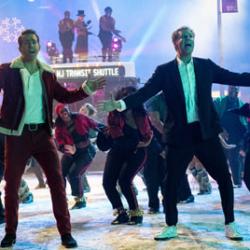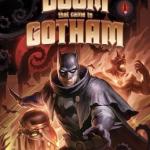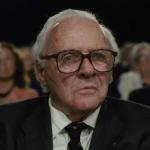Review of The World’s End, Directed by Edgar Wright
By ANDREW COLLINS
For viewers who can stomach the language, The World’s End hits all the big comedy targets. It shamelessly borrows and mocks tropes from the well-worn Hollywood canon (just look at this poster, for starters) and strikes with well-crafted irony at both micro and macro levels. The dialogue snaps between characters with delightful chemistry (the British accents don’t hurt), and the whole business takes place in an absurd scenario (why in the world does a drinking adventure take place in a town full of alien-robot people?).
Simon Pegg, Nick Frost, and director Edgar Wright, the funnymen behind Shaun of the Dead and Hot Fuzz, return to their signature small town England setting without missing a beat. But this time, Pegg and Frost take on three more accomplices—played by Eddie Marsan, Paddy Considine, and Martin Freeman respectively.
Back in their schooling days, Gary King (Pegg) and the boys had it made, the world before them. They owned their town, with their childhood together cumulating on a final grand night in which they attempted the “Golden Mile,” a 12-pub crawl that ends at a bar called The World’s End. They didn’t make it, and for some, the experience didn’t end pleasantly.
Now, 20 years later, all have grown up and settled in to adult life, except Gary, who hasn’t changed a bit. That’s not hyperbole. He drives the same old car and listens to the same cassette tapes that he had back in the day. He still dresses the same—black jeans, black boots, and a black tee with a black necklace and black trench coat. In his despair at trying to cope with his now-pointless life at an AA-like support group, he decides to rally the old gang and give the pub crawl another go. In it, he sees a chance to recapture the perfect moment by making it all the way through 12 drinks to The World’s End. The others could care less, but they go along for the ride anyways, with Gary only persuading the most reluctant by lying that his mother had died.
Back together, hilarity ensues as five grown men pile into Gary’s jalopy and return to their hometown for the Golden Mile. Many of these comedic moments turn on clashes of age, time, freedom, and meaning, and the film handles them in a manner either cliché or absurd. We’ve all seen the guy who won’t grow up pitted against the man who settles down to a stable but tame life of career and family. That joke happens over and over again, but Pegg is so over the top that it stays funny the whole time.
For example, rather than actually swear, Freeman’s character self-consciously uses the clunky acronym “WTF” through the film. At one point Gary, in a perfect encapsulation of his character, asks, “What the f*** does ‘WTF’ mean?” Or when Freeman’s sister comes into town, Gary figures he can pick up their juvenile relationship of hooking up in the bathroom right where it left off (a notion she quickly dispels). The film’s great conflict, in fact, pits Gary against his friends in a disagreement over the value of completing the Golden Mile. For him, it is the only thing that makes life worth living. It represents his ideal of what it means to be free and have a good time. They all have successful lives to go back to, at least superficially, while Gary only has memories of being the coolest guy in town.
Complicating this misplaced sense of the past is an alien invasion that has turned almost everyone in the town into automatons. They look exactly like their former selves and still retain selective memories from their past. And just for theatrical effect, their heads and limbs easily pop off in a splatter of blue blood-like liquid.
The gang’s madcap adventure culminates in an almost heartfelt moment. Gary and Frost’s characters reconcile their torn friendship when Gary learns that the “perfect” lives of his buddies may not be so perfect after all, and there may be more to life for him than completing the Golden Mile.
However, in an inverse of conventional storytelling in which the hero must rise to the challenge, Gary saves the world from intergalactic assimilation by being himself: telling earth’s invaders to “f*** off” and bluntly standing up for the human race’s right to be “screw-ups.” And in the ashes of victory, he finds himself mostly unchanged from where he started. Having exchanged the idol of a perfect moment for radical self-autonomy, Gary presses on because he’s still Gary King, “the King,” and as a free man he has the right to pursue a good time.
It’s a pathetic moral of the story, but in a film where half the jokes hinge on the main character’s ineptness, I don’t think it’s fair to take any higher meaning seriously. Like Gary, viewers “just want to have a good time,” and that’s all this absurd bar-hop through a mass of alien automatons purports to do.












